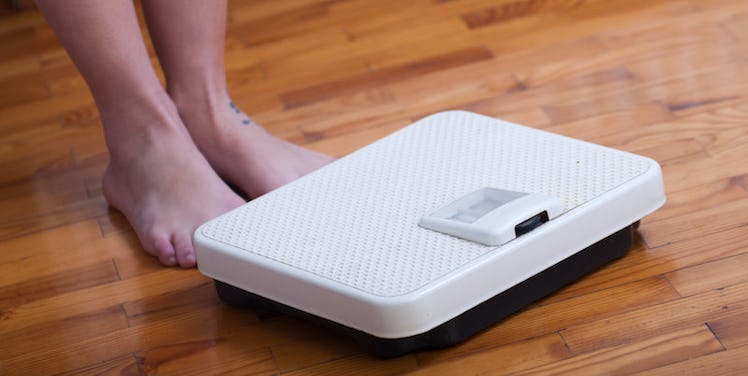
The 5 Simple Reasons Why You're Not Losing Weight In Your 20s
You go to the gym religiously, sip (okay, guzzle) vodka sodas instead of sugary drinks, and keep up with all the nutrition trends. But between all the kale salads and pressed juices, you can't seem to shed those pesky few pounds your frame is holding on to. Here are some hidden culprits that might be sabotaging your efforts.
1. You're dehydrated.
You've all heard about the benefits of drinking more water -- better skin, more energy, fewer cravings, etc. Despite that, it's safe to bet that when your 3 pm craving hits, the advice to “drink a glass of water when you're hungry and wait 10 minutes” gets left behind on your way to the snack drawer.
Drinking more water will help suppress your appetite, encourage your body to burn fat, and prevent fluid retention (that bloated belly you get when your body is dehydrated and desperately holding on to whatever fluids it can get). An added benefit: it will keep you looking younger, longer. Your future self thanks you.
Tip: First thing each morning, drink a big glass of H2O with lemon to rehydrate and help your body detoxify. The Instagram stalking can wait 2 minutes.
2. You have an undiagnosed food allergy.
You follow all the rules – Greek yogurt for breakfast, popcorn for a healthy snack, and whole-wheat pasta at dinner. So what gives with that stubborn, extra layer around your stomach?
You may be sensitive to, or even intolerant of, one of the top seven food allergens: corn, soy, wheat, dairy, citrus, eggs and nightshade vegetables (tomatoes, eggplant, pepper, potatoes). Eating something that you're sensitive to causes inflammation in the body.
In the long-term, that spells serious health issues, while in the short-term you'll experience discomfort, bloating, and carrying extra weight. By figuring out what doesn't work for your body and cutting it out, you could lose up to seven pounds in just one week.
Tip: Try an elimination diet to figure out your food sensitivities -- just cut out the top allergens for three weeks, and add them back in one by one to see your body's response. And no, telling people that you're gluten intolerant as an excuse not to eat carbs doesn't count as a diagnosis.
3. You're all wrong about fat.
Eating fat will not make you fat. Take a minute to let that sink in. The low-fat diet craze was popular in the 1990s, but now is about as cool as your Limited Too bellbottoms.
Your body was designed to fill up on fat, and is built to burn it for energy and then shut down the appetite when it's had enough. Munching on low-fat snacks all day will leave you unsatisfied and full of sugar, which is actually what gets converted directly into body fat.
Eating foods with higher fat content will make you feel full and cut down on your food cravings, rev your metabolism to slim you down, and will enable your body to actually use the fat-soluble nutrients in the veggies you're bothering to eat. Step away from the potato chips, though -- I'm talking wholesome, unprocessed fats.
Tip: Pour extra virgin olive oil on salads, use coconut oil or macadamia oil for cooking, eat full-fat dairy products, and snack on nuts and nut butters (just check for added sugars and oils -- Justin's is a good brand to try).
4. You're drinking your calories.
Relax, no one is asking you to give up happy hour; booze isn't the only liquid that has empty calories. Having a large skim latte in the morning, coconut water with lunch, and a fresh juice in the afternoon can add up to 500 calories to your daily intake, all without making you feel full. Still drinking diet soda? That's playing a big role in keeping you hungry and bloated.
Switch to water as your go-to drink, and forgo the lattes in favor of good ol' black coffee with milk. You'll be doing both your waistline and your wallet a favor.
Tip: Just because it's organic and costs $10 doesn't make your juice healthy. Many fruit juices have as much sugar as a glass of Coke! Go for juices that are heavy on greens and light on fruit (aim for an 80/20 ratio).
5. You're doing the wrong kind of exercise.
Your friend lost 10 pounds by running on the treadmill for two hours every night, so you do the same and wonder what's wrong with you when you don't get the same results.
Guess what – you're not your friend (thank God, because she obviously has no social life) and what works for her is not necessarily going to work for you. Spend time trying out different classes at the gym to see what your body responds to.
I know plenty of people who gave up extended bouts of cardio in favor of strength training and yoga, and the weight fell right off.
Bottom line, the exercise that is going to help you lose weight is the exercise that you enjoy doing. Gritting your teeth through an aerobics class when you'd rather be in downward dog is no way to live, and definitely not the most sustainable route to take.
Tip: You don't burn nearly as many calories doing cardio as the machine says. Don't let your workout be an excuse to over-indulge. Stick to your normal eating schedule even on days when you work out, just adding a bit more protein to your post-workout meal.
A final note: don't fall for the one-size-fits all diet or exercise routine. Instead, take the time to figure out what works for your body -- you'll strip that extra layer and maintain your ideal weight (and your sanity) effortlessly.
Top Photo Courtesy: Mean Girls